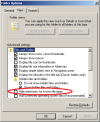You need VMS
http://www.angelfire.com/mo3/martin0/c/c_intro.html
The return 0 is important. The zero is the exit status of the program, which can be interrogated by the caller. Zero is guaranteed to indicate success in the operating system being used. On UNIX, 0 indicates success, so no change is made. On DEC VAX/VMS, success is indicated by 1 in $SEVERITY, so the zero will be translated to 1.
More here, if you're using that particular compiler...
http://www.ctrl-c.liu.se/conan?key=CRTL~exit%2C_exit&explode=yes&title=VMS+Help&referer=/
